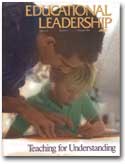Untracking: Why Not Fair-Minded Dialogue?
The flak drawn by my article “Untracking Advocates Make Incredible Claims” (October 1993) reveals the extent to which untracking reformers assume that their astonishing claims should be uncritically accepted. Unfortunately, the issue of untracking involves real people who will suffer if untracking is uncritically implemented.
Jeannie Oakes charged that I personally attacked her (“Reply: Untracking Evidence Is There for the Taking”). Do requests for evidence constitute personal attacks? I simply described my efforts to secure specific facts that support claims of the educational benefits of untracking. I also objected to the assertion that ability grouping constitutes a form of racism. Such argumentation closes off constructive debates and insults individuals of all races.
No doubt that Oakes knows a great deal about personal attacks. She refers to the bad social science I use, my farfetched analogies, misguided notions, and more. Let's get some facts straight. I responded to a theme issue of Educational Leadership (Untracking for Equity, October 1992) that equated untracking with a higher form of morality. More than 20 pages described pro-untracking propaganda with not one word about its possible drawbacks. The overriding message was that all students should receive essentially the same instruction since high standards should apply to all. Interpreted literally, this means that IQ is not a useful index in formulating instructional strategies and that educators can ignore brain structure and function as well as the impact of severe environmental deprivation.
My statements were a modest effort to balance the scale. Yet in the editing process my article was truncated and the thrust of some statements diluted. No art or photos accompanied it and more space was allotted to rebuttal than to my remarks.
Issues inherent to untracking are complex. Open and comprehensive debate should precede any serious effort to implement such a reform. I've invited Professor Oakes to debate the merits and demerits of untracking. The invitation still stands.
—Ralph Scott, Professor of Educational Psychology, University of Northern Iowa, Cedar Falls, Iowa
Teachers vs. Professors: A False Dichotomy
I have long respected Dona Kagan's work with student teachers, but I am perplexed about her latest effort to set up a dichotomy between professors and K–12 teachers (“Who Should Decide How Teachers Teach?” October 1993). Her research design establishes her as the interpreter of both the professors' and the teachers' words. Why didn't the teachers and professors talk together while the author facilitated the conversation? Why were the names and backgrounds of the teachers mentioned in the article but not the professors'?
It's a pity that the design of the research was misguided because the effort to describe this implicitly political struggle is worthwhile. The dichotomy suggested, however, is too simple by far. The two teachers don't fit neatly into one view nor do professors represent one perspective.
Most of my colleagues do not glibly engage in an easy dismissal of the activities of traditional teachers. Many of us have a passion to work with colleagues in public schools and want to “forge a more equitable relationship between professors and teachers.” This article gets us nowhere in that effort.
—H. James McLaughlin, Assistant Professor, Department of Elementary Education, The University of Georgia, Athens, Georgia
Teachers Shape Evaluation Processes
I read with interest “How Teachers Are Shaping Evaluation Procedures” (Black, October 1993). The practices espoused sound a lot like those we used in the Southeast Island School District. One difference is that tenured teachers can opt out of the regular evaluation in favor of a Professional Development Plan. Only when their performance falls below the district's standards can tenured teachers be required to receive the nontenured teacher's evaluation.
Nontenured teachers undergo three formative evaluations a year, each conducted by a different administrator. At the end of the year the three write summative evaluations. Another component that I suggest adding to the Plan of Improvement is a teacher review team to monitor and assist teachers with correcting deficiencies in time for the next evaluation.
—Gordon E. Castanza, Director of Federal Programs, Lower Yukon School District, Mt. Village, Alaska
Technical Assistance Offered
I appreciated the three articles in the October 1993 issue on teacher research (Emily F. Calhoun; Rita Wright Johnson; Christene K. Bennett). Those responsible for changing practice must be the ones involved in researching how to do it.
The articles make clear both the power of this approach and some of the elements needed to support teachers involved. Just knowing about action research collaboratives is not enough to get started. Our Action Research Center has a decade of experience and resources to disseminate. Readers interested in technical assistance might want to write or call us at (617) 969-7100.
—Molly Lynn Watt, Director, Action Research Center, Education Development Center, 55 Chapel St., Newton, MA 02160
